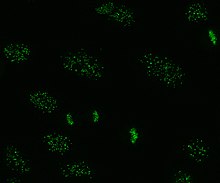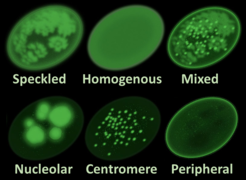
Anti-centromere antibodies (ACAs; often styled solid, anticentromere) are autoantibodies specific to centromere and kinetochore function. They occur in some autoimmune diseases, frequently in limited systemic scleroderma (formerly called CREST syndrome), and occasionally in the diffuse form of scleroderma. They are rare in other rheumatic diseases and in healthy persons.
Anti-centromere antibodies are found in approximately 60% of patients with limited systemic scleroderma and in 15% of those with the diffuse form of scleroderma. The specificity of this test is >98%. Thus, a positive anti-centromere antibody finding is strongly suggestive of limited systemic scleroderma. Anti-centromere antibodies present early in the course of disease and are notably predictive of limited cutaneous involvement and a decreased likelihood of aggressive internal organ involvement, such as fibrosis in the lungs.[1]
When present in primary biliary cirrhosis, ACAs are prognostic of portal hypertension such that serum ACA levels correlate with the severity of portal hypertension.[2]
-
A schematic representation of an antibody
- ^ JB Imboden, DB Hellmann, JH Stone. Current Rheumatology Diagnosis & Treatment, Second Edition. McGraw-Hill, 2007.
- ^ Nakamura M, Kondo H, Mori T, et al. (2007). "Anti-gp210 and anti-centromere antibodies are different risk factors for the progression of primary biliary cirrhosis". Hepatology. 45 (1): 118–27. doi:10.1002/hep.21472. PMID 17187436.
- ^ Al-Mughales JA (2022). "Anti-Nuclear Antibodies Patterns in Patients With Systemic Lupus Erythematosus and Their Correlation With Other Diagnostic Immunological Parameters". Front Immunol. 13: 850759. doi:10.3389/fimmu.2022.850759. PMC 8964090. PMID 35359932.
Minor edits by Mikael Häggström, MD
- Attribution 4.0 International (CC BY 4.0) license

